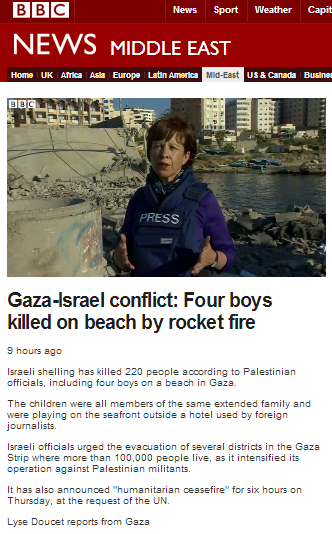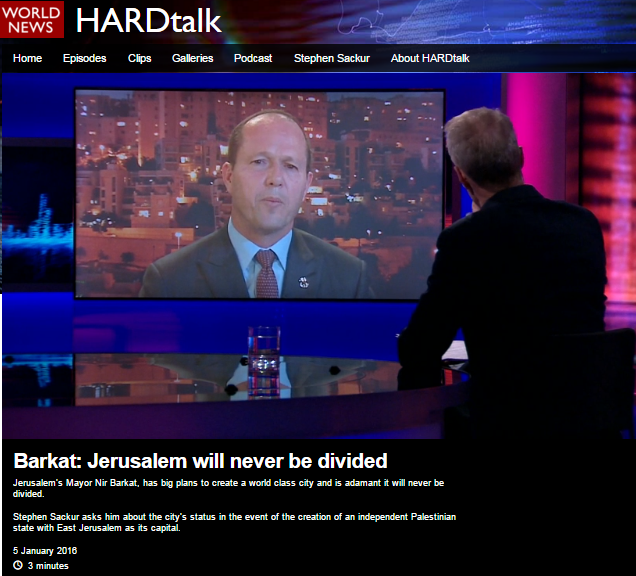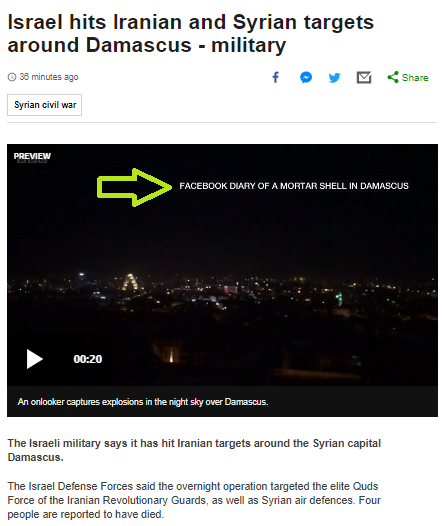“As ever with stories coming out of the Israel-Palestine conflict there are two versions of events. We did our best to try and keep an open mind and I accept that we may not always have been as open as we might have been in terms of giving the audience sight of those two different versions of events.”
“In terms of the Middle East, we’re not in the business of reporting chatter and gossip.”
“And I think it is our job simply to lay the facts before the audience and to allow the audience to make up their mind, particularly on a story that’s so significant.
It’s not our job to speculate. It’s not our job to attribute blame to anybody and it’s up to the audience to form their own judgements.”
The above remarks were made by the then BBC World News Editor Jon Williams in response to criticism of the corporation’s handling of coverage of the deaths of seven Palestinian civilians on a beach in the Gaza Strip in June 2006.
Nevertheless, six years later BBC journalists were quick to promote an unverified version of events surrounding the death of the son of a BBC employee during Operation Pillar of Defence and that unsubstantiated version of events – later shown by a UN HRC investigation to be wrong – instantly blamed Israel. BBC damage control then ensued.
If one thought that the BBC would perhaps, in the light of previous experience, be a little more careful about apportioning blame before the results of a professional investigation into a tragic incident had been published, then two years on in Operation Protective Edge one would find that nothing has changed in the organisational culture which underpins BBC reporting in this part of the world.
Lyse Doucet’s July 16th filmed report broadcast on the 10 p.m. BBC television news programme and also promoted on the BBC News website’s Middle East page under the title “Gaza-Israel conflict: Four boys killed on beach by rocket fire” opens with Doucet stating unequivocally:
“An Israeli warplane hit a naval container in Gaza’s port today. Some children ran for cover. Then; a second strike almost immediately. These children didn’t escape. Emergency services rushed the bodies away. Some are so charred they’re too gruesome to show. It’s not clear what the target was at this port.
Israel insists it only targets the infrastructure used by Hamas – terror targets as it calls them. Now, previously it hit this post. It was used by the Hamas naval police to control the fishermen. But the boats aren’t going out to sea because Israel controls the coastline. So we’re told that children who were here were all children of fishermen, scavenging for metal to try to support their families.
Four boys aged nine to eleven died in the two attacks; all from the same extended family. They were buried together within hours. Nine days into this crisis the death toll in Gaza is now at least 200.”
An investigation into the tragic incident which took place near the Al Deira Hotel in Gaza City on July 16th was commenced immediately and is still ongoing. Preliminary findings indicate that the target of the attack was Hamas operatives and indeed at least one journalist present at the scene has clarified that terrorists did operate in the vicinity of the hotel.
“It is not unusual for militants to launch rockets from sites near my hotel. Israeli missiles and shells have also landed pretty close to al-Deira, an old red stucco inn with a large terrace overlooking the Mediterranean Sea. Just a few hundred yards down the beach is the fishing harbor.” [emphasis added]
Doucet, however, not only refrains from providing BBC audiences with that highly relevant information, but specifically says “It’s not clear what the target was at this port”.
She also implies that a previous strike in the same area was unjustified because “boats aren’t going out to sea because Israel controls the coastline”. Israel’s control of Gaza’s coastal waters is in fact defined under the terms of the Oslo Accords to which the representatives of the Palestinian people were willing signatories. Those agreements created ‘Zone L’ off the Gaza coast which was designated for “fishing, recreation and economic activities”, subject to specific provisions, including the following:
“As part of Israel’s responsibilities for safety and security within the three Maritime Activity Zones, Israel Navy vessels may sail throughout these zones, as necessary and without limitations, and may take any measures necessary against vessels suspected of being used for terrorist activities or for smuggling arms, ammunition, drugs, goods, of for any other illegal activity. The Palestinian Police will be notified of such actions, and the ensuing procedures will be coordinated through the MC.” [emphasis added]
Following the Israeli withdrawal from the Gaza Strip, the November 15th 2005 agreement signed between Israel and the Palestinian Authority (Agreed documents on movement and access from and to Gaza) made no change to the above provisions.
The naval blockade on the Gaza Strip was introduced in January 2009 in response to terrorist activity provides a zone for fishing, so Doucet’s claim that fishermen do not go to sea because “Israel controls this coastline” is clearly inaccurate and misleading.
A Guardian correspondent also present at the scene on July 16th wrote:
“A witness who identified himself only as Abu Ahmed said the boys had been scavenging for scrap metal when the first shell hit a nearby shipping container used in the past by Hamas security forces.” [emphasis added]
In other words, Doucet’s claim that “It’s not clear what the target was at this port” is once again shown to be nowhere near as clear-cut as she tries to make out and importantly, her failure to provide audiences with information on the topic of terrorist activity in the area from which she reports means that they are unable to appreciate how and why an event such as the accidental deaths of children may have come about.
Notably too, Doucet’s citation of casualty figures – along with the report’s synopsis as it appears on the BBC News website – fails to qualify them with any reference to the nature and reliability of their source and fails to distinguish between combatants and civilians.
The results of the investigation into the tragic events of July 16th will no doubt be published as soon as possible. By then, of course, it is not improbable to expect that inaccurate and unverified early BBC reporting will once again already have created a narrative which no amount of facts will later dispel.




